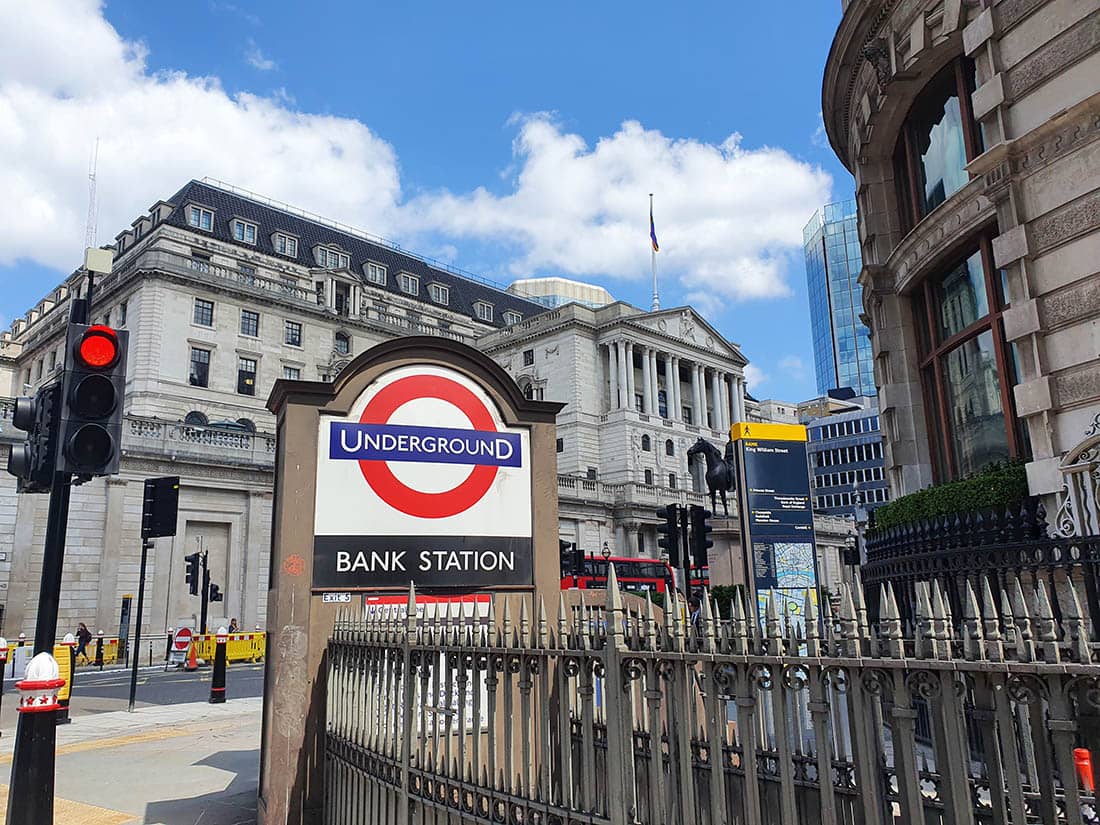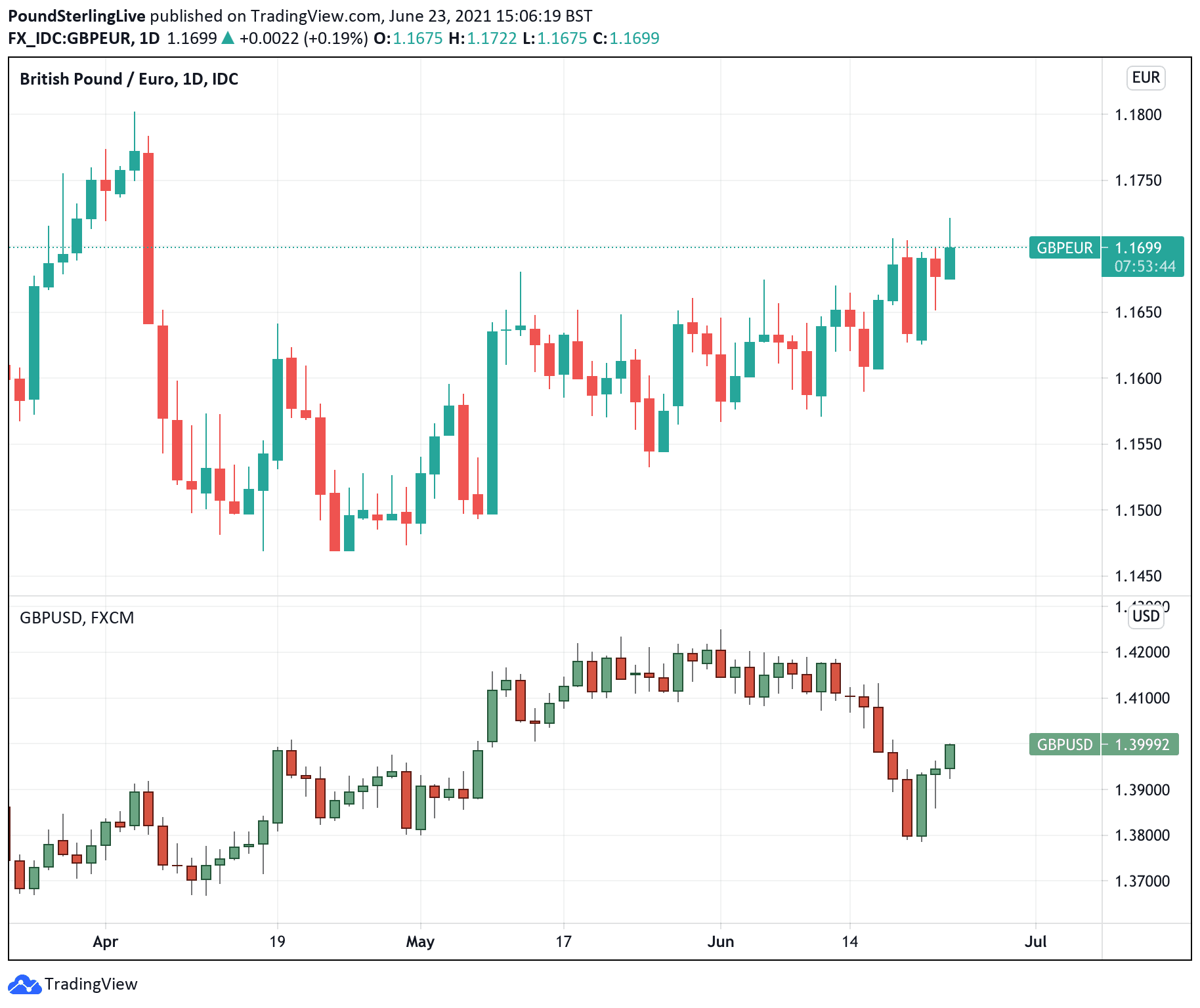Pound Sterling Today: Bank of England to Determine Whether the Rebound against the Euro and Dollar can Extend
- Written by: Gary Howes
-
- Hawkish BoE tipped to aid GBP upside
- UK inflation seen heating up
- But could strike caution on rising Covid cases

Image © Pound Sterling Live
- Market rates at publication: GBP/EUR: 1.1707 | GBP/USD: 1.3960
- Bank transfer rates: 1.1480 | 1.3666
- Specialist transfer rates: 1.1620 | 1.3860
- Get a bank-beating exchange rate quote, here
- Set an exchange rate alert, here
The British Pound will today take direction from the Bank of England which will issue fresh guidance on policy and the outlook for interest rates and the economy.
The Bank of England (BoE) will likely keep interest rates and quantitative easing levels unchanged at current levels, but the tone struck by policy makers will decide whether a short-term rebound in the UK currency can extend.
"Sterling bulls appear to be regrouping ahead of a Bank of England policy announcement Thursday that could see officials take a page out of the Fed’s hawkish playbook. A central bank that should play up recovery optimism would likely focus market attention on prospects for higher rate policy, a topic that’s typically currency friendly," says Joe Manimbo, Senior Market Analyst at Western Union Business Solutions.
The next significant policy guidance will likely only come at the August meeting when the Bank releases its next Monetary Policy Report, but the June event could give a potential steer to investors on what decisions lie over the horizon.
Above: GBP/EUR top pane, GBP/USD bottom pane.
Secure a retail exchange rate that is between 3-5% stronger than offered by leading banks, learn more.
Currently analysts see the BoE headed in a Sterling-supportive direction as it looks to be one of the early movers on interest rates, with markets expecting the first rate hike to take place in 2022.
Such a move would put it ahead of the Federal Reserve and European Central Bank (ECB), offering support for the Pound against the Dollar and Euro.
According to Jens Nærvig Pedersen, Chief Analyst, FX and Rates Strategy at Danske Bank, risks are tilted towards a slightly 'hawkish' shift at the BoE meeting, which he says would support the Pound-to-Euro exchange rate.
"If anything the BoE may have a hawkish tilt given the higher-than-anticipated inflation prints," says Pedersen.
Expectations for higher-than-anticipated inflation in the UK were further raised by the release of PMI data midweek that showed inflationary pressures facing UK companies was at exceptional levels in June.
Typically the Bank would be expected to react to strong inflation readings by raising interest rates, (which is on balance supportive of the Pound), however policy makers have thus far said they see inflation as being a transitory phenomenon and expect it to fall back below 2.0% on a sustained basis.
Any hints at Thursday's meeting that the Bank is becoming nervous inflation could become more enduring over coming months might help the Pound move higher.
Image courtesy of Capital Economics.
But it is not just inflation that is coming in hotter than expected as labour market figures are looking more robust than economists had expected.
The PMI survey for June showed employment growth has reached a record high amid sharply rising workloads, which should ease concerns that the UK will face a large jump in unemployment when the government's job support scheme ends in September.
Foreign exchange analysts at JP Morgan say they sense the BoE will be in a position to raise interest rates in the final quarter of 2022, "and potentially even slightly sooner".
If realised, such a move is expected by a number of foreign exchange analysts to create the necessary divergence between the BoE and the ECB to create upward pressures on the Pound-Euro exchange rate.
"We also now see somewhat more headroom for GBP to appreciate against EUR on a clear divergence in monetary policy," says Paul Meggyesi, Head of FX Research at JP Morgan.
Analysts at BNP Paribas say they are backing a higher Pound-Euro on the central bank divergence theme, noting that levels above 1.20 could be possible as a result.
Strategists at the France based global lender and investment bank say there could be as much as 10% upside in GBP/EUR on offer over the coming year.
"Our positive view is based on our estimate of GBP’s long-term valuation and our expectation that the BoE will tighten monetary policy faster than the market is pricing in," says a quarterly strategy note from BNP Paribas.
BNP Paribas says they expect the BoE to be one of the first to move, because it has not changed its monetary policy strategy in a markedly more dovish direction, has little track record of undershooting inflation and has existing forward guidance that puts a lower threshold for tightening than for other central banks.
BNP Paribas now expect asset purchases (quantitative easing) will end in December, and the first rate hike to take place in August 2022.
{wbamp-hide start}{wbamp-hide end}{wbamp-show start}{wbamp-show end}
The UK economic rebound that brings with it heating rates of inflation and solid employment developments are reasons for the BoE to pivot in a 'hawkish' direction, but there are also developments that could compel a more cautionary approach from policy makers.
Foremost amongst these is the rise in Covid-19 cases the UK has seen over recent weeks that have ultimately pushed the government into delaying the lifting of all restrictions.
The developments come alongside immediate-term data that shows the rate of economic recovery might have peaked in recent weeks, potentially a sign that consumers and businesses have become somewhat more cautious.
"Both the ONS’ Business Impact of Covid-19 survey and the BoE’s CHAPS payments data suggest activity has flatlined in recent weeks," says Samuel Tombs, Chief UK Economist at Pantheon Macroeconomics.
"The biggest danger now comes from the Delta Covid-19 variant, and in particular whether it dampens buoyant confidence levels," says James Smith, Developed Markets Economist at ING Bank.
The BoE will be conscious that striking a too optimistic tone on the outlook risks pushing up bond yields (the cost of borrowing) in UK financial markets, which could slow expansion.
"For now there is no real pressure on the BoE to materially adjust its stance. Both lack of data post-furlough scheme and the delayed reopening cloud the picture on slack reduction," says Jonathan Cohn, a strategist at Credit Suisse.
Policy makers could therefore opt to strike a sanguine tone build around rising Covid-19 cases and the potential for higher unemployment from September, when the government's jobs support scheme ends, that could be interpreted by markets as being 'dovish'.
Such a scenario could see the Pound give back some of its recent gains.
{wbamp-hide start}{wbamp-hide end}{wbamp-show start}{wbamp-show end}

